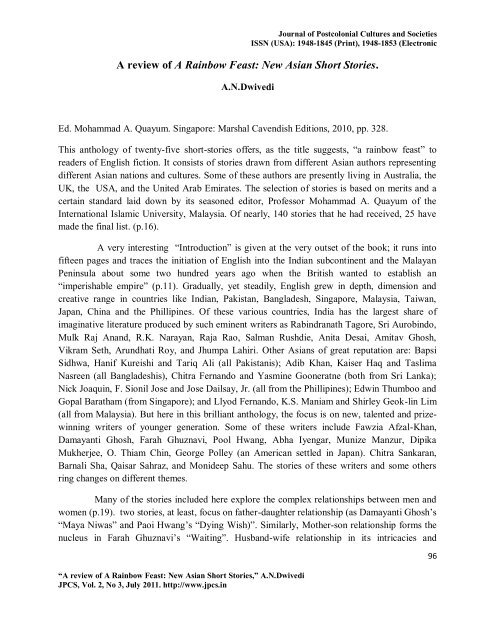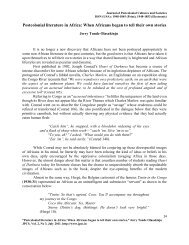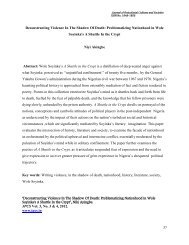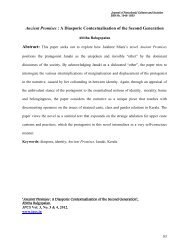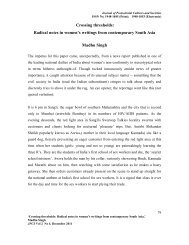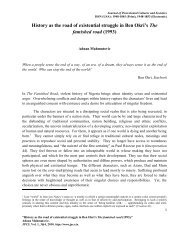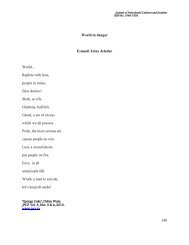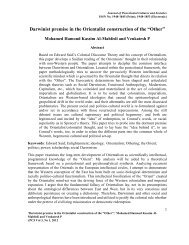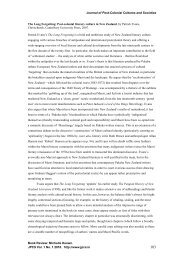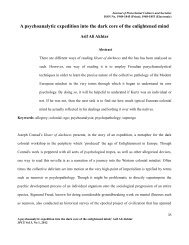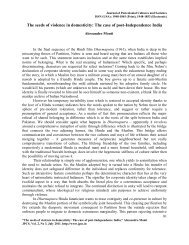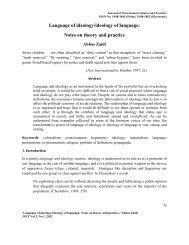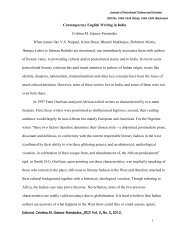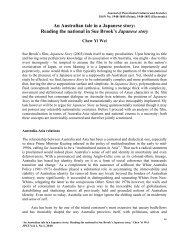A review of A Rainbow Feast: New Asian Short Stories. - JPCS
A review of A Rainbow Feast: New Asian Short Stories. - JPCS
A review of A Rainbow Feast: New Asian Short Stories. - JPCS
You also want an ePaper? Increase the reach of your titles
YUMPU automatically turns print PDFs into web optimized ePapers that Google loves.
Journal <strong>of</strong> Postcolonial Cultures and Societies<br />
ISSN (USA): 1948-1845 (Print), 1948-1853 (Electronic<br />
A <strong>review</strong> <strong>of</strong> A <strong>Rainbow</strong> <strong>Feast</strong>: <strong>New</strong> <strong>Asian</strong> <strong>Short</strong> <strong>Stories</strong>.<br />
A.N.Dwivedi<br />
Ed. Mohammad A. Quayum. Singapore: Marshal Cavendish Editions, 2010, pp. 328.<br />
This anthology <strong>of</strong> twenty-five short-stories <strong>of</strong>fers, as the title suggests, “a rainbow feast” to<br />
readers <strong>of</strong> English fiction. It consists <strong>of</strong> stories drawn from different <strong>Asian</strong> authors representing<br />
different <strong>Asian</strong> nations and cultures. Some <strong>of</strong> these authors are presently living in Australia, the<br />
UK, the USA, and the United Arab Emirates. The selection <strong>of</strong> stories is based on merits and a<br />
certain standard laid down by its seasoned editor, Pr<strong>of</strong>essor Mohammad A. Quayum <strong>of</strong> the<br />
International Islamic University, Malaysia. Of nearly, 140 stories that he had received, 25 have<br />
made the final list. (p.16).<br />
A very interesting “Introduction” is given at the very outset <strong>of</strong> the book; it runs into<br />
fifteen pages and traces the initiation <strong>of</strong> English into the Indian subcontinent and the Malayan<br />
Peninsula about some two hundred years ago when the British wanted to establish an<br />
“imperishable empire” (p.11). Gradually, yet steadily, English grew in depth, dimension and<br />
creative range in countries like Indian, Pakistan, Bangladesh, Singapore, Malaysia, Taiwan,<br />
Japan, China and the Phillipines. Of these various countries, India has the largest share <strong>of</strong><br />
imaginative literature produced by such eminent writers as Rabindranath Tagore, Sri Aurobindo,<br />
Mulk Raj Anand, R.K. Narayan, Raja Rao, Salman Rushdie, Anita Desai, Amitav Ghosh,<br />
Vikram Seth, Arundhati Roy, and Jhumpa Lahiri. Other <strong>Asian</strong>s <strong>of</strong> great reputation are: Bapsi<br />
Sidhwa, Hanif Kureishi and Tariq Ali (all Pakistanis); Adib Khan, Kaiser Haq and Taslima<br />
Nasreen (all Bangladeshis), Chitra Fernando and Yasmine Gooneratne (both from Sri Lanka);<br />
Nick Joaquin, F. Sionil Jose and Jose Dailsay, Jr. (all from the Phillipines); Edwin Thumboo and<br />
Gopal Baratham (from Singapore); and Llyod Fernando, K.S. Maniam and Shirley Geok-lin Lim<br />
(all from Malaysia). But here in this brilliant anthology, the focus is on new, talented and prizewinning<br />
writers <strong>of</strong> younger generation. Some <strong>of</strong> these writers include Fawzia Afzal-Khan,<br />
Damayanti Ghosh, Farah Ghuznavi, Pool Hwang, Abha Iyengar, Munize Manzur, Dipika<br />
Mukherjee, O. Thiam Chin, George Polley (an American settled in Japan). Chitra Sankaran,<br />
Barnali Sha, Qaisar Sahraz, and Monideep Sahu. The stories <strong>of</strong> these writers and some others<br />
ring changes on different themes.<br />
Many <strong>of</strong> the stories included here explore the complex relationships between men and<br />
women (p.19). two stories, at least, focus on father-daughter relationship (as Damayanti Ghosh’s<br />
“Maya Niwas” and Paoi Hwang’s “Dying Wish)”. Similarly, Mother-son relationship forms the<br />
nucleus in Farah Ghuznavi’s “Waiting”. Husband-wife relationship in its intricacies and<br />
“A <strong>review</strong> <strong>of</strong> A <strong>Rainbow</strong> <strong>Feast</strong>: <strong>New</strong> <strong>Asian</strong> <strong>Short</strong> <strong>Stories</strong>,” A.N.Dwivedi<br />
<strong>JPCS</strong>, Vol. 2, No 3, July 2011. http://www.jpcs.in<br />
96
Journal <strong>of</strong> Postcolonial Cultures and Societies<br />
ISSN (USA): 1948-1845 (Print), 1948-1853 (Electronic<br />
sensitivities occupy the central stage in many <strong>of</strong> these stories; for example, Fayeze Hasant’s<br />
“Green Card”, Razia Sultana Khan’s “Seduction”, Lau Siew Mei’s “Passion’s Fruit in the<br />
Flowerbed”, Dipika Mukherjee’s “Baby’s Breath”, Chitra Sankaran’s “Alone and Palely<br />
Loitering”, Barnali Saha’s “The Gambler”, Qaisra Shahraz’a “The Zemindar’s wife”, and<br />
Veerena Tay’s “Broken”. There are, then, some interesting stories in this anthology that expose<br />
the evils <strong>of</strong> patriarchy (p.20); for instance, Saud Khatab Ali’s “The Subjugated Ones”, Razia<br />
Khan’s “Seduction”, Dipika Mukherjee’s “Baby’s Breath”, and Verena Tay’s “Broken”.<br />
This collection <strong>of</strong> short stories has rich variety in content and compactness in form.<br />
Many stories are unified in plot, but Lan Siew Mei’s “Passion’s Fruit in the Flowerbed” is patchy<br />
and fragmented and Pr<strong>of</strong>. Quayum even calls it “a post-modern story”(p.22). Keeping in mind<br />
the vast variety, subtle complexity, and imaginative fecundity <strong>of</strong> the stories contained in this<br />
collection, we can really say that here’s “a rainbow feast” that can cater to the taste <strong>of</strong> readers <strong>of</strong><br />
every mood and shade <strong>of</strong> thought. The editor has demonstrated his discretion to choose the best<br />
stories at hand, and he must be complimented for performing this task excellently.<br />
Biography<br />
Pr<strong>of</strong>essor A.N. Dwivedi, an award winning poet and critic, has to date published about 100<br />
research articles in local and international journals and a dozen books <strong>of</strong> literary criticism, three<br />
books <strong>of</strong> translation and four books <strong>of</strong> poetry. His collections <strong>of</strong> poetry are: Random Reflections<br />
(<strong>New</strong> Delhi: BRPC, 1994), Fine Frenzy (Allahabad: Kitab Mahal, 1998), Protest Poems<br />
(Calcutta: Writers Workshop, 2002) and Beyond Borders (<strong>New</strong> Delhi: Adhyayan Publishers,<br />
2008)<br />
Book details: A <strong>Rainbow</strong> <strong>Feast</strong>: <strong>New</strong> <strong>Asian</strong> <strong>Short</strong> <strong>Stories</strong>, Ed. Mohammad A. Quayum.<br />
Singapore: Marshal Cavendish Editions, 2010, pp. 328.<br />
“A <strong>review</strong> <strong>of</strong> A <strong>Rainbow</strong> <strong>Feast</strong>: <strong>New</strong> <strong>Asian</strong> <strong>Short</strong> <strong>Stories</strong>,” A.N.Dwivedi<br />
<strong>JPCS</strong>, Vol. 2, No 3, July 2011. http://www.jpcs.in<br />
97


